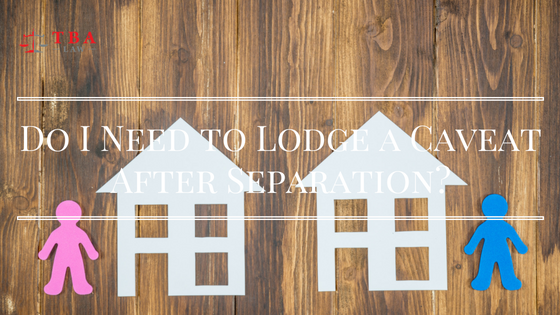Do I Need to Lodge a Caveat After Separation?
by Lajita Allan-Agnew
I am separated from my partner/spouse, “do I need to lodge a caveat on our property?”. A caveat on real property serves to warn anyone dealing with that property that someone has a priority interest in that property.
It is a common occurrence in de facto relationships, or even marriages, that the real property is often only in one parties name. The risk and fear for the party who is not on the title is that they will lose out on the benefit of that property despite their contributions towards it. If both names are registered on the title, then no caveat is needed.

Take for example Bob and Jane. Bob and Jane met 12 years ago and when they met, they both had second hand cars only. They moved in together and they saved enough money to buy a ‘work in progress house’. Bob convinced Jane that the property should be in his name and Jane thought nothing of it for they were going to live happily ever after till death do them part. They had two children and they continued to save and improve the property.
The house was all but paid off when the relationship became violent and Jane left the home. Bob stayed in the house and Jane had to find a place to rent. Because their relationship was a de facto relationship, Jane had two years from the date of separation to make a claim in the Family Court. She tried to negotiate a settlement but Bob told her that the house was in his name and she would have to earn her own house.
Jane had made contributions to the house from her wages, her labour towards the renovations and she worked night shifts to save on day care and after school fees. Her contributions translated to “an equitable interest” in the real property and gave the her the right to place a caveat on it.
A caveat on the property ensured that until Bob and Jane came to a property settlement, Bob could not sell the property or borrow against it. Once Bob and Jane reached an agreement and the agreement was executed, the caveat was removed.
The above example is an example of when you can lodge a caveat and although it was appropriate for Bob and Jane, you cannot lodge a caveat whenever you feel you have been wronged. In fact, there are penalties for lodging a caveat without reasonable cause.
If parties separate and the caveator lodges a caveat without further justification for example an ‘equitable interest’ and this prevents the owner from selling or refinancing their interest, the owner can lodge a 21-day lapsing notice. This will lapse the caveat after 21 days if no application otherwise is made in the Supreme Court (and granted). The caveator is also likely to be liable for any costs incurred, and for lawyers, a potential finding of professional misconduct.
We at TBA Law look forward to helping you if you would like more information or wish to obtain advice on whether you need to place a caveat on a property to protect your interest.





Leave A Comment